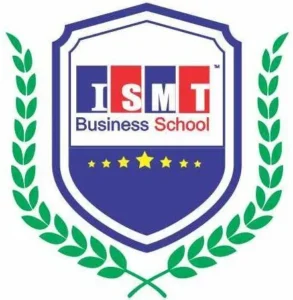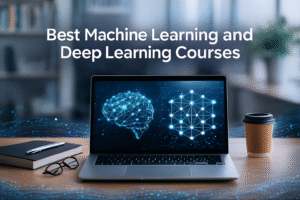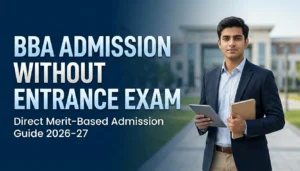1 — Why a certification matters now
With employers asking for demonstrable skills, a targeted certification gives you a verified signal: you can design models, prepare data, train and tune networks, and — crucially — deploy solutions. A certification shortens hiring friction by turning experience into a credential hiring managers recognize.
But not all certificates are equal. Some teach theory (good for research roles), others prove cloud and MLOps skills (critical for applied roles), and some show hands-on expertise with frameworks like TensorFlow or PyTorch. Choosing the best certification for machine learning and ai means aligning the credential to what you actually want to do.
2 — Who should get which certification (role-based guidance)
- Newcomers / career changers: Start with an applied Coursera/edX specialization or an entry-level university certificate that includes a capstone project. A beginner-friendly deep learning training course that covers basics, CNNs, RNNs, and a capstone is ideal.
- Data scientists seeking ML roles: Look for best certification for machine learning and ai that cover model development and evaluation, plus a project portfolio. A recognized specialization plus a production-focused certification (cloud ML or MLOps) is powerful.
- Software engineers / MLOps: Prioritise cloud-vendor certifications (AWS, Google Cloud, Azure) and training in containerization, CI/CD for ML, and monitoring.
- Researchers / PhD-track: Focus on university-level advanced ML or deep learning courses with strong theory and papers assignments.
- Managers / product leaders: Pick a strategic certificate that covers ML lifecycle, ethics, and business use-cases — not necessarily hands-on coding.
3 — Top certification types and what they prove
Below are the common categories. Decide which proof you need before enrolling.
- Platform/Cloud Certifications (AWS, Google Cloud, Azure): Show you can deploy and scale ML in production. Strong choice if your role touches cloud deployment or MLOps.
- Framework Certificates (TensorFlow Developer Certificate, PyTorch certificates): Demonstrate hands-on coding ability in a key framework. Great for developers and engineers.
- University Specializations (Coursera/edX/University programs): Offer structured theory + project work. Good for broad foundational skills.
- Bootcamp / Professional Certificates (short, intensive): Fast, project-driven, and often career-service oriented. Useful for job-ready skills if the provider is reputable.
- Research/Advanced Certificates: Focus on math, optimisation, and recent architectures — valuable for research roles.
Each type has trade-offs in depth, recognition, and time-to-complete. The certification for machine learning and ai for you balances depth with market recognition.
4 — How to choose the best certification for machine learning and ai — 5-step checklist
- efine the job you want (ML engineer, data scientist, MLOps, researcher).
- Check curriculum alignment — does the program cover model building, deployment, or both? If you want production work, ensure cloud/DevOps content.
- Look for hands-on projects — real projects with data, code, and a deployed demo matter more than multiple-choice exams.
- Verify recognition and instructor quality — industry partners, faculty credentials, and graduate outcomes are signals.
- Cost vs ROI — estimate time and money and compare it to salary uplift or hiring outcomes. Free resources are fine for basics; paid certificates are often worth it for career transition.
5 — Sample 6-month study roadmap
Month 1 — Foundations
- Linear algebra refresh, Python, pandas, scikit-learn basics.
- Complete one small project: data cleaning + baseline model.
Month 2 — Core ML
- Supervised learning, model evaluation, feature engineering.
- Build a classification project and write a short blog post.
Month 3 — Deep learning basics
- Take a deep learning training course covering neural networks, CNNs, and simple RNNs.
- Build and train a CNN on an image dataset.
Month 4 — Applied ML & MLOps intro
- Learn model deployment basics: REST APIs, Docker, simple CI.
- Deploy one model to a cloud endpoint or a simple container.
Month 5 — Advanced topics
- Transformers, transfer learning, and model optimization.
- Add advanced features to your portfolio project.
Month 6 — Certification prep + portfolio polish
- Take timed mock exams, finish capstone, prepare GitHub repo and a one-page project summary.
- Practice behavioral and technical interview questions.
This roadmap pairs well with many professional and best certification for machine learning and ai and ensures you have both the credential and tangible projects.
6 — Helpful enhancements (resume lines, interview bullets, and project ideas)
Resume bullets (examples):
- “Deployed image classification model as REST API using Docker and Google Cloud Run; achieved 92% validation accuracy.”
- “Implemented transfer learning with a pre-trained ResNet backbone; reduced training time by 60%.”
- “Completed a 6-month deep learning training course with a capstone on time-series forecasting.”
Interview talking points:
- Explain trade-offs when choosing models (bias/variance, inference cost).
- Describe one production issue you solved (data drift, latency, scaling).
- Walk through a project end-to-end: data → model → deployment → monitoring.
Project ideas for portfolio:
- Expense fraud detection (tabular data + explainability).
- Personalised recommendation prototype using embeddings.
- End-to-end chatbot using transformer fine-tuning and Docker deployment.
7 — Why choose ISMT Business School for this path
ISMT Business School offers instructor-led courses and hands-on labs tailored to working professionals. Located at:
ISMT Business School
Opp. Arunkumar Vaidya Ground, Next to Old MHB Colony Bus Stop, Old MHB Colony, 3 min from Don Bosco Signal, Gorai Road, Borivali-West, Mumbai-91
Website: www.ismtindia.com
📞 Contact:
+91-9930526101
+91-8976055540
📩 Email: info@ismtindia.com
If you’re looking for guided mentorship, project review, and a classroom environment that mimics workplace collaboration, ISMT’s programs are built to bridge the gap between theory and applied ML. (Contact details and program dates are available on the website.)
FAQs
Q1: What is the single best certification for beginners?
A: There’s no single best for everyone, but a well-structured university specialization with a capstone (for example, an established Coursera/edX specialization) plus a small framework certificate (TensorFlow / PyTorch) is a common effective combo.
Q2: Should I pick cloud or framework certifications first?
A: If you already code comfortably, start with framework certification (TensorFlow/PyTorch). If your role will require deployment or you’re targeting MLOps, pick a cloud ML certification.
Q3: How long does it take to prepare?
A: For someone with programming basics, 3–6 months of focused study with hands-on projects is a realistic timeline for entry-to-mid level certifications.
Q4: Are free courses effective?
A: Yes for fundamentals. For career switching, paid certificates that include projects, feedback, and job services often give better placement outcomes.
Q5: What should my portfolio include?
A: 2–3 end-to-end projects with code, dataset source, results, a short write-up, and a deployed demo or recorded walkthrough.
Q6: How many times should I mention the keyword in my resume?
A: Use targeted phrases naturally — employers search for specific skills or roles (e.g., “machine learning engineer”, “deep learning”, framework names) rather than repeating the certification keyword.
Q7: Do certificates expire?
A: Some vendor certifications require renewal (cloud vendors often do). Check the issuer’s policies before enrolling.
Q8: Which is better for deep learning: academic program or bootcamp?
A: Academic programs often provide stronger theory; bootcamps are usually more applied and quicker. Choose based on whether you need research depth or immediate job readiness.
Final checklist — pick the right certification now
- Are you aiming for research, engineering, or product? → Narrow the certificate type.
- Does it include hands-on projects and a deployable demo? → Prefer certificates that do.
- Will the certificate be recognized by employers in your target market? → Check alumni outcomes.
- Can you commit 3–6 months? → If yes, plan the roadmap above.





